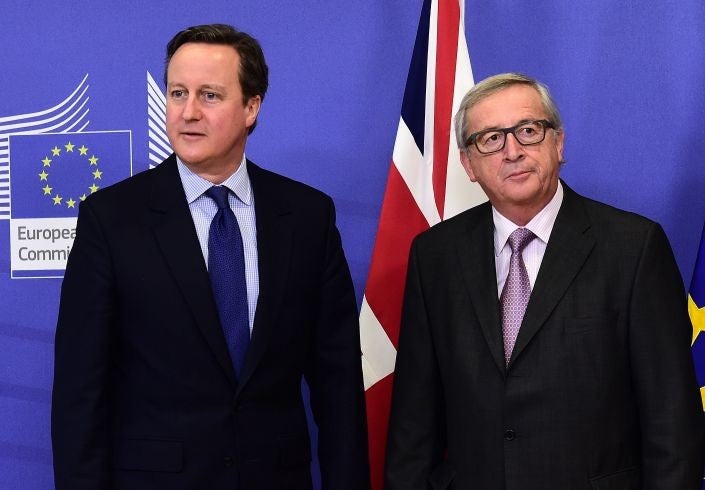EU referendum: David Cameron warns Jean-Claude Juncker his proposals don't go far enough to secure renegotiation
Speculation the PM is talking down prospects of agreement before announcing a victory next month

David Cameron has warned the European Commission President Jean-Claude Juncker that his proposals to keep Britain in the EU did not yet go far enough to secure a deal and needed “more work”.
In a downbeat assessment after talks with Mr Juncker in Brussels the Prime Minister said that progress was made but added: “It’s not enough”.
However some observers suggested that Mr Cameron was deliberately talking down prospects of an agreement in order to stage manage a “victory” at the key European summit next month that will sign off on any final agreement.
Martin Schulz, the President of the European Parliament who also met Mr Cameron, struck a notably more upbeat note. He said the talks with the Prime Minister were a “very open-minded exchange of views” and he was “optimistic” of a deal.
“We are now entering a very decisive moment in preparing the referendum,” he said.
Mr Schulz said a deal would depend on the “goodwill from all sides” but he acknowledged “the devil is in the detail”.
“There are some of the proposals of the UK which are common sense – that we must be more transparent, more democratic, more effective, more competitive,” he said.
“It’s clear there are a lot of people thinking we should also be more social, more responsible, more welfare-oriented – so we have to look if the two sides are compatible.” He added: “I am optimistic there will be a deal mid-February.”
The Prime Minister’s meeting in Brussels aimed to complete the UK’s renegotiation deal, with the last piece of the jigsaw concerning plans for an “emergency brake” on migrant benefits if the Government can show that public services such as healthcare or schools are overwhelmed.
Mr Cameron will receive the European Council President Donald Tusk for dinner at Downing Street tomorrow for what officials say is “a meeting to dot the i’s and cross the t’s”. Mr Tusk, who will chair the high-stakes EU summit in Brussels on 18-19 February devoted to the UK renegotiation, is then expected to send out a “concrete proposal” to fellow EU leaders on Monday.
Cameron will fly to Hamburg on 12 February to speak at a banquet hosted by the German Chancellor Angela Merkel, who has also played a key role in liaising between capitals on the renegotiation.
Two trips to Denmark and Sweden were scrapped so that Cameron could make his last-ditch appeal in Brussels, as he aims to wrap up the renegotiation in time for a late-June referendum on Britain’s membership of the EU.
The emergency brake proposal aims to freeze benefits for EU workers in Britain without breaching the EU’s core principles on free movement. It could last for up to four years, and would fulfil Mr Cameron’s Conservative manifesto pledge to curb immigration.
Mr Cameron said he was encouraged by the suggested mechanism, because “what I was previously told was impossible is now looking like it is possible”, while he added that there was “still a long way to go” before a deal could be finalised. It is not yet clear what criteria would be used to determine an emergency, but the brake would be available to all EU members, not just Britain. The brake is described as an “indirect measure” as it does not ban migrants but rather seeks to remove the incentives for moving to the countries such as Britain. Decisions to authorise the brake would lie with EU governments and not with the European Commission.
There is less controversy about Mr Cameron’s other renegotiation demands, which include safeguarding against more political integration, protecting the countries that do not use the euro, and improving the EU’s economic competitiveness.
Subscribe to Independent Premium to bookmark this article
Want to bookmark your favourite articles and stories to read or reference later? Start your Independent Premium subscription today.

Join our commenting forum
Join thought-provoking conversations, follow other Independent readers and see their replies